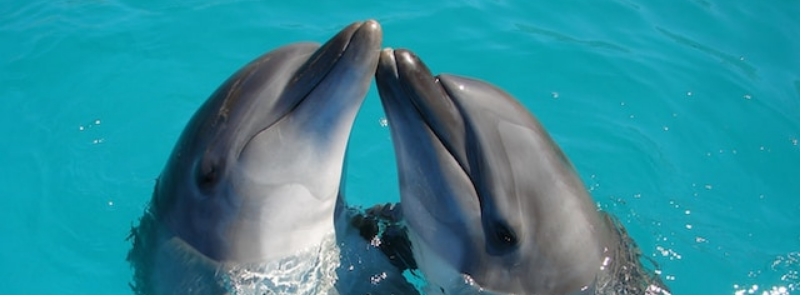
When It Occurs
Every April 14th
Timeline
Days Passed (1045)
# Hashtags
#NationalDolphinDay #MarineLife
Dolphins captivate us with their infectious joy, always appearing delighted to interact with us! These lively and playful porpoises not only bring joy to people but also play a crucial role in safeguarding the marine ecosystem of our ocean waters.
National Dolphin Day is a special occasion dedicated to celebrating dolphins, with a primary goal of educating people about these intelligent creatures and their vital contributions to ocean conservation.
What is National Dolphin Day?
National Dolphin Day is a day set aside to honor dolphins, promote conservation efforts to protect them, and educate the public about the challenges they face in the wild. It’s a time to recognize the importance of dolphins in marine ecosystems and the need to ensure their survival for future generations.
Significance of National Dolphin Day
- Raising Awareness: National Dolphin Day serves as a platform to raise awareness about the threats dolphins face, including habitat loss, pollution, and entanglement in fishing gear.
- Celebrating Intelligence and Social Behavior: Dolphins are known for their high intelligence, complex social structures, and ability to communicate with one another, making them a subject of fascination and study.
- Encouraging Conservation: The day encourages support for conservation programs and organizations dedicated to protecting dolphin populations and their habitats.
How to Celebrate National Dolphin Day
- Learn About Dolphins: Take time to read books, watch documentaries, or explore online resources about dolphins. Learn about their behavior, communication, and the different species that exist around the world.
- Visit an Aquarium or Marine Center: Many aquariums and marine centers have programs and exhibits dedicated to dolphins. Visiting one of these facilities can provide a closer look at these animals and support organizations that work to protect them.
- Support Dolphin Conservation: Donate to or volunteer with organizations that focus on dolphin conservation. Many groups work to protect dolphins from threats like pollution, climate change, and bycatch.
- Participate in a Beach Cleanup: Pollution is a significant threat to dolphins and other marine life. Participating in a local beach cleanup can help reduce the amount of waste that enters the ocean and protect dolphin habitats.
- Share on Social Media: Use the hashtag #NationalDolphinDay to share facts, photos, or stories about dolphins. Raising awareness through social media can help spread the message of conservation and appreciation for these animals.
Interesting Facts About Dolphins
- Highly Intelligent: Dolphins are among the most intelligent animals on Earth. They have large, complex brains, and exhibit behaviors such as problem-solving, using tools, and recognizing themselves in mirrors.
- Social Creatures: Dolphins live in groups called pods, which can range from a few individuals to over a thousand. They communicate with each other using a variety of clicks, whistles, and body movements.
- Variety of Species: There are over 40 species of dolphins, ranging from the well-known bottlenose dolphin to the lesser-known Amazon river dolphin.
- Echolocation: Dolphins use echolocation to navigate and hunt for food in the ocean. This involves emitting sound waves and listening for the echoes that bounce back from objects, allowing them to "see" their surroundings even in murky waters.
Conservation Challenges Facing Dolphins
- Habitat Loss: Coastal development, pollution, and climate change are leading to the destruction of important dolphin habitats, such as coral reefs and mangroves.
- Bycatch: Dolphins are often accidentally caught in fishing nets, a phenomenon known as bycatch. This is a significant threat to dolphin populations, particularly in areas with intense fishing activity.
- Pollution: Marine pollution, including plastic waste, chemicals, and oil spills, poses serious threats to dolphins. Ingesting or becoming entangled in debris can lead to injury or death.
- Hunting and Captivity: In some parts of the world, dolphins are hunted for their meat or captured for display in marine parks. Both practices raise significant ethical and conservation concerns.
The Importance of Dolphin Conservation
- Ecosystem Health: Dolphins play a crucial role in marine ecosystems as apex predators. They help maintain the balance of species in their environment by controlling fish and squid populations.
- Indicator Species: Dolphins are considered an indicator species, meaning their health reflects the overall health of their marine environment. Protecting dolphins often means protecting broader marine ecosystems.
- Cultural Significance: Dolphins have been revered in many cultures throughout history, symbolizing freedom, joy, and intelligence. Protecting them is also about preserving cultural heritage.
Why People Love Dolphins
- Friendly and Playful Nature: Dolphins are known for their friendly and playful behavior, often approaching boats and interacting with humans, which endears them to people worldwide.
- Fascination with Intelligence: The intelligence of dolphins, their complex communication, and problem-solving abilities make them fascinating subjects for study and admiration.
- Ambassadors of the Ocean: Dolphins often serve as ambassadors for the ocean, helping to raise awareness about the importance of marine conservation and the need to protect our seas.
National Dolphin Day is a meaningful occasion to celebrate these incredible animals and to take action to ensure their protection. Whether through education, conservation efforts, or simply appreciating their beauty and intelligence, this day offers a chance to make a difference in the lives of dolphins and the health of our oceans.


